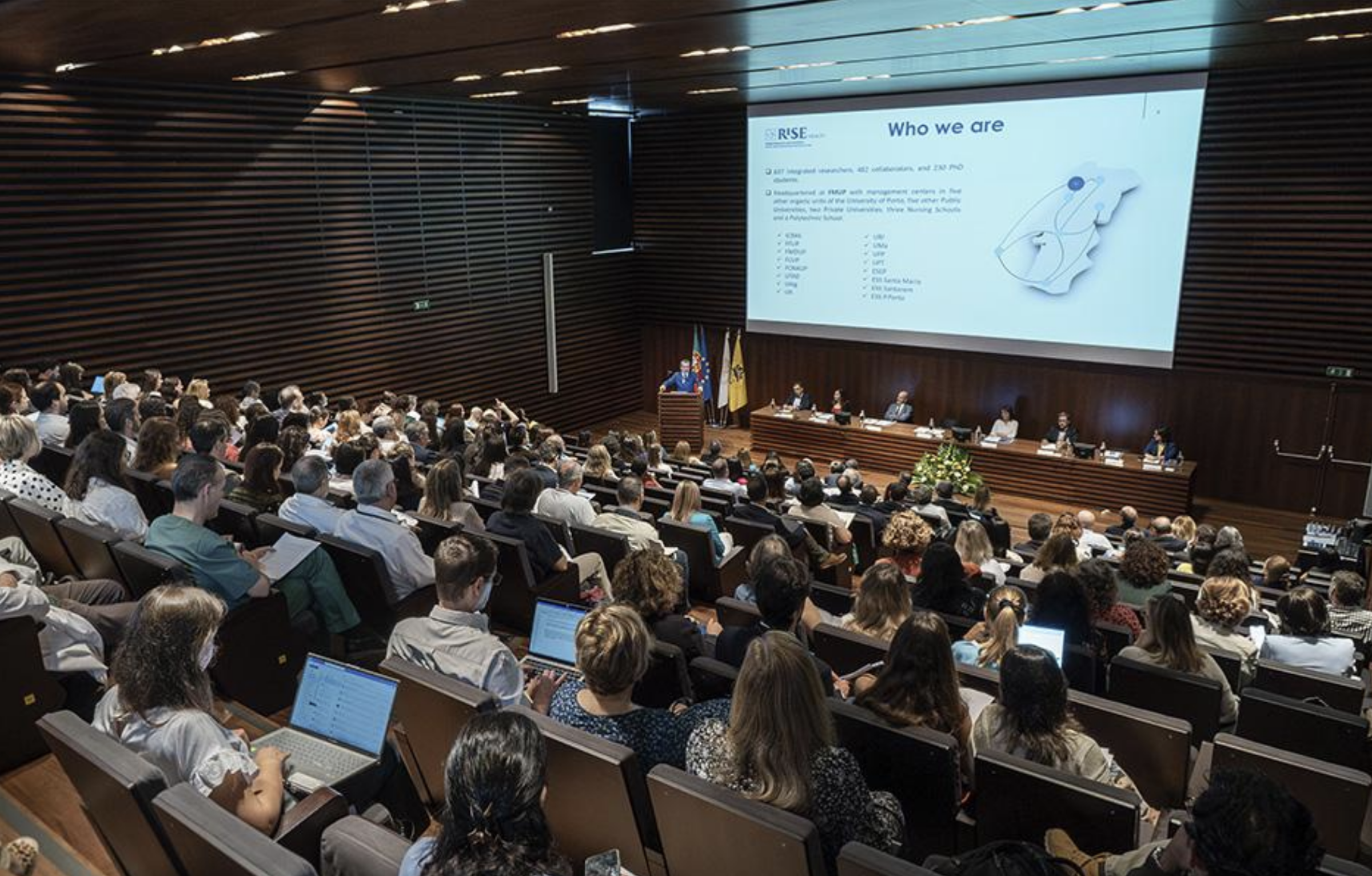News / RISE-Health Research Unit Brings Together Researchers at FMUP
Around 300 researchers from all over the country gathered at the Faculty of Medicine of the University of Porto (FMUP) on June 28 to take part in the 1st Working Meeting of the new RISE-Health Research Unit, born from the merger of two Research Units based at FMUP, CINTESIS and UnIC, joined by MedInUP and CICS – University of Beira Interior.

It was with “a twinge of pride” that the director of the FMUP did the honors of the “house” to the researchers of this new unit, which is already “the largest in the country” in terms of the number of people who are part of it, according to the application.
During the opening ceremony, Altamiro da Costa Pereira stressed that this will be a “more robust” unit that can be heard more easily “in Lisbon”.
For the president of AICIB – Agency for Clinical Research and Biomedical Innovation, the RISE-Health Unit is playing a “remarkable” role in bringing people together and being “a source of inspiration”. Responding to a challenge from the director of FMUP to be a “catalyst” for funds, Nuno Sousa assured that his intention is to put clinical research “on the agenda”.
In his speech, the Director of RISE-Health, Fernando Schmitt, began by asking for a round of applause for the “host and mentor of this idea”, Altamiro da Costa Pereira, who played a leading role in one of the most emotional moments of the event.
For the unit’s leader, this is a “great opportunity” to “change clinical research in Portugal”, which is “clearly underfunded”. At the beginning of the event, Fernando Schmitt had already referred to the need to build a “bridge” over the “chasm between basic research and clinical research”, to bring these two universes closer together.
The vice-rector of the University of Porto, Pedro Rodrigues, also praised this “absolutely unusual and unparalleled project in terms of synergies and will”, which he called a “ship” and an “aircraft carrier”, believing that it will be able to “pool efforts” and gain “the necessary dimension” to respond to people’s problems and to raise international funding.
The opening ceremony was also attended by representatives of some of RISE-Health’s partner higher education institutions, namely the Nursing School of Porto (ESEP), the University of Beira Interior (UBI), the Higher School of Health of the Polytechnic Institute of Porto (ESS-IPP) and the University of Trás-os-Montes and Alto Douro (UTAD). Representatives from various parts of the University of Porto (Faculty of Pharmacy, Faculty of Dental Medicine, and Instituto de Ciências Biomédicas Abel Salazar), University of Madeira, University Fernando Pessoa, the School of Health of IP Santarém, the School of Health of Santa Maria, among others, were also present.
Luís Carvalho, president of ESEP, acknowledged that “the starting point is extremely ambitious”, but that together they will be able to do “more and better than the sum of the parts”. Emídio Gomes, UTAD’s rector, is already working on a “financial envelope” for RISE-Health. Cristina Prudêncio, president of ESS-IPP, expressed her institution’s pride at being part of this “network”, while Sílvia Socorro, Vice-Rector for Research, Innovation and Development at UBI, called the new unit “a bastion of what research can be in Portugal”.
During the morning, the seven coordinators of the seven Thematic Lines (TL) had the opportunity to present their objectives and structure, coinciding in the translational perspective of research, from the molecule to the patient’s bedside, from in vitro studies to biobank samples, with a focus on clinical results and the contribution to health and a real impact on society. Everyone also highlighted the importance of infrastructures, multidisciplinary teams, students and links with teaching.
The current head of LT1 – Clinical and Translational Research in Cardiovascular Sciences, Adelino Leite Moreira, a professor at FMUP who coordinated UnIC, a unit that for 30 years was “exclusively dedicated to narrowing” the so-called “valley of death” between basic and clinical sciences, said that there was a lack of “a voice at national level that drew attention to the need to value clinical research”.
Elsa Azevedo, also a professor at FMUP, presented TL2 – Neurosciences, which she coordinates and whose main focus is the nervous system, in particular the prevention, diagnosis, and treatment of diseases that affect the nervous system. Luís Taborda Barata, a professor at UBI, spoke as coordinator of TL3 – Hormones, Infection, Inflammation & Metabolism, stressing that the mission is to “go from the molecule to the community and back to the molecule” in the study of disease mechanisms and subtypes, biomarkers, diagnosis and monitoring, response to treatments and resistance to antimicrobials.
Cristina Granja, a professor at FMUP, who leads TL4 – Hospital care & clinical outcomes, shared her enthusiasm due to the “immense support from medical colleagues”, including young people starting their clinical careers, and listed some of the national and international projects in which her Line is involved, such as SESAM SIMUniversity 2024, recently won by a team from FMUP.
Paulo Correia de Sá, coordinator of TL5 – Clinical Translational on Drug Targets and Innovative Biomedicines, referred to the human resources and “differentiating infrastructures” created over the years, which will be the essential “breeding ground” for “breaking the gap” between basic and clinical sciences.
Coordinating TL6 – Digital Transformation, Artificial Intelligence, Data and Decision Sciences in Health, Luís Azevedo reaffirmed the commitment to digital transformation, artificial intelligence, data science, and decision in health to take a leading role in defining more appropriate, evidence-based and people-centered health policies. Finally, Elisa Keating, head of TL7- Community Care & Prevention, said that despite the restrictions on patient recruitment, the community is “permeable” and that “funding constraints” are the greatest threat to clinical research, which she considered to be “orphaned” in our country.
The event also included meetings of four working groups – Infrastructure, Human Resources, Advanced Training and Internationalization – which have begun to take their first steps, as António Soares, RISE-Health’s Executive Director, explained.